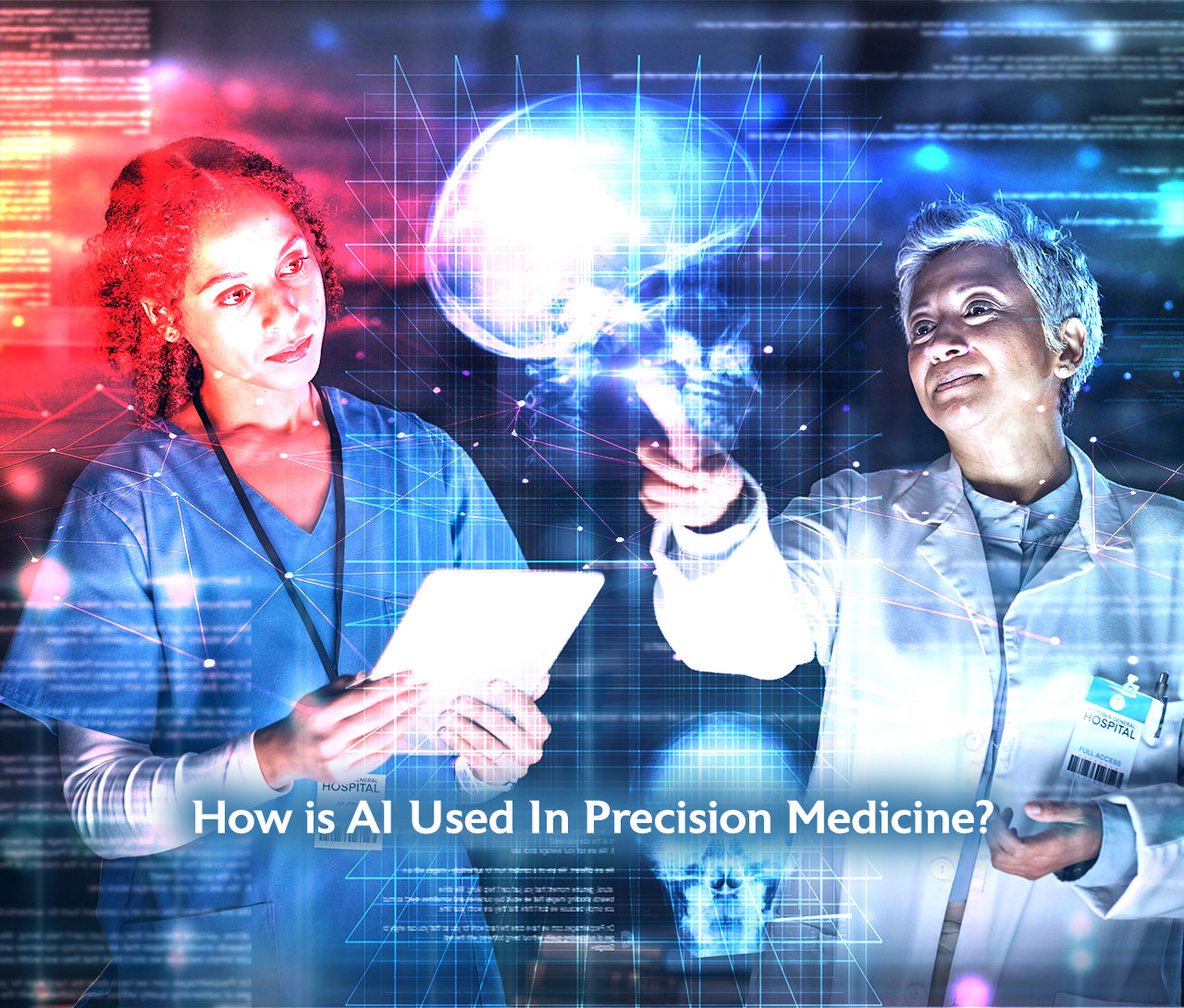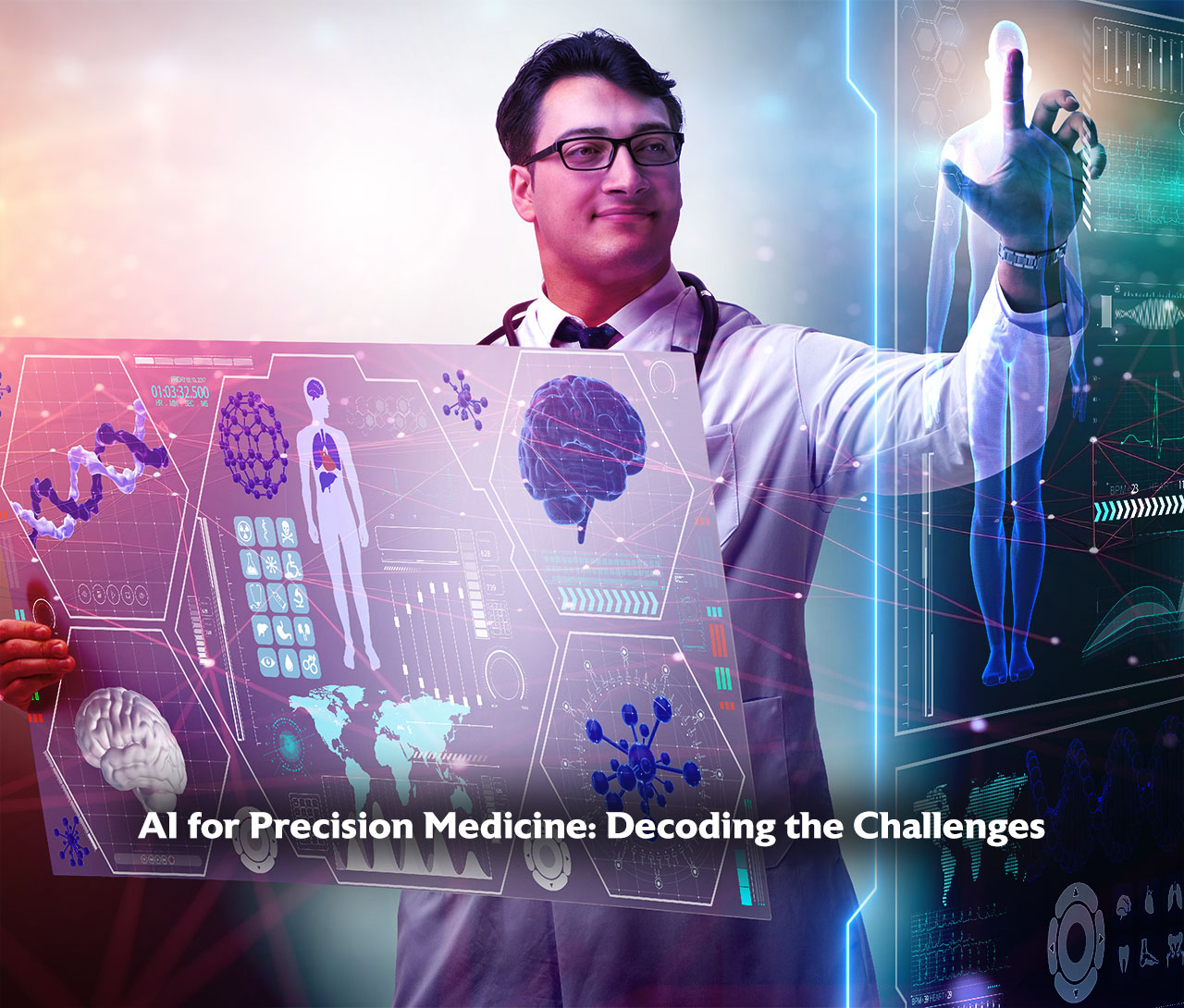Artificial intelligence (AI) is undoubtedly the hero of this century and people just can’t have enough of it. The rising integration of AI in almost every other field has only left everyone wanting more. By 2025, the overall market revenue of AI is anticipated to hit a whopping $190 billion adding a staggering amount of $15.7 trillion to the global gross domestic product (GDP).
The same goes for the healthcare industry, and AI for precision medicine is slowly transforming the medical field. Without further ado, let’s delve right in and learn about the top 5 AI for personalized medicine trends.
How is AI Used In Precision Medicine?
Precision medicine aims to personalize healthcare by considering individual variability in genes, function, and environment. AI-driven precision medicine plays a crucial role in several areas, including disease prevention, personalized diagnosis, and personalized treatment. AI technologies, such as machine learning algorithms, assist in analyzing large biological datasets to identify patterns and make predictions.
Here are the five key trends in AI used in precision medicine:
- Disease Prevention: AI analyzes data from various sources, like electronic health records (EHRs), to identify risk factors and develop predictive models. By leveraging AI, healthcare providers can identify individuals at high risk of developing certain diseases and implement preventive measures accordingly.
- Personalized Diagnosis: AI algorithms improve diagnostic accuracy and performance in various medical specializations, including radiology. For example, AI-based algorithms can detect abnormal lesions that may progress to cancer, aiding in early diagnosis and treatment. AI also assists in analyzing a patient’s unique characteristics to develop personalized treatment plans.
- Personalized Treatment: AI helps optimize treatment strategies by considering individual patient characteristics and predicting treatment outcomes. For instance, AI can analyze large datasets to identify optimal drug combinations tailored to a patient’s specific genetic profile. This approach, known as precision oncology, aims to develop personalized treatment plans based on a patient’s own biopsy.
- Data Analysis and Mining: AI is instrumental in collecting, storing, normalizing, and tracing healthcare data. By leveraging AI technologies, healthcare providers can mine large volumes of medical records and other data sources to extract valuable insights and improve the delivery of healthcare services. AI can also assist in sorting unstructured electronic health record data, enabling researchers to extract key information about diagnoses, treatments, and outcomes.
- Advancements in Research and Development: AI drives advancements in research and development for precision medicine. It helps researchers analyze complex biological datasets and identify patterns that can lead to discoveries and insights. AI can also aid in drug repurposing and development, pharmacogenomics, and mining the medical literature for relevant information.
AI plays a crucial role in advancing precision medicine by enabling personalized care, improving diagnostic accuracy, optimizing treatment strategies, and facilitating data analysis and mining. By leveraging AI technologies, healthcare providers can deliver more effective and tailored healthcare services to individuals.
AI for Precision Medicine: Decoding the Challenges
AI for precision medicine faces significant challenges that impact its transition to real-world healthcare as per recent research. One critical concern is fairness and bias, as health data biases in sampling and imputation methods can lead to discriminatory AI decisions, affecting clinical applicability. Efforts to mitigate bias include diverse data collection initiatives and AI fairness toolkits, but more work is needed in biomedical research.
Socio-environmental factors pose another challenge, where the performance of AI models may vary based on the environmental conditions and workflows in real clinical settings. Prospective studies have shown unexpected challenges, emphasizing the importance of validating AI models in diverse clinical environments and incorporating user feedback for continuous improvement.
Data safety and privacy are paramount, with the increasing collection and integration of sensitive health data. Establishing a secure ecosystem for data storage and management is essential, requiring technological advancements, collaborations, and the development of robust regulations. Balancing the potential of AI in precision medicine with these challenges is crucial for ensuring its ethical, effective, and widespread implementation in healthcare.
AI-Driven Precision Medicine To Be Blamed For Misdiagnosis?
Humans are cynical and the first question that pops in our mind about AI is their trustworthiness. With AI for precision medicine market expected to accrue $17.1 billion by 2032, the looming question of trust still seems to be left unanswered. The ethical guidelines are playing catch-up with these rapidly advancing technologies, leading to uncertainties about accountability.
Safety concerns are prompting a concerted effort to ensure AI development aligns with reliability and responsibility. Collaborations between our lab and clinicians are actively refining models, ensuring they learn from accurate and unbiased data. Simultaneously, we’re pioneering validation methods for AI systems, prioritizing safety, reliability, and the ability to explain predictions to both clinicians and patients.
Amidst these challenges, it’s crucial not to lose sight of AI’s potential to transform healthcare. The focus is on a human AI empowerment agenda, using AI as a tool to enhance, not replace, human capabilities. The aim is not to create autonomous agents replacing humans but to establish a partnership where machine learning boosts human cognitive and decision-making abilities. This synergy propels both AI and healthcare professionals to new levels of effectiveness and innovation.
Winding Up
The AI for precision medicine has revolutionized healthcare by enabling personalized care, improving diagnostic accuracy, optimizing treatment strategies, and facilitating data analysis and mining. AI technologies, such as machine learning algorithms, have the ability to analyze large biological datasets and identify patterns that may not be easily detected by human analysis alone. This has led to advancements in disease prevention, personalized diagnosis, and personalized treatment, ultimately leading to more effective and tailored healthcare services for individuals.


